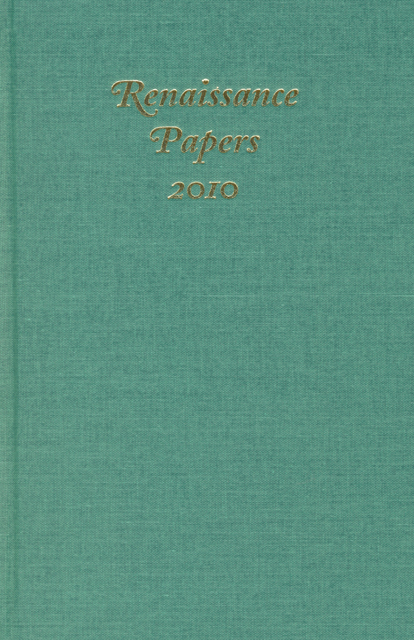Book contents
- Frontmatter
- Contents
- Renaissance Papers
- Aretino’s Life and His Afterlife in England
- Mixing Genres in George Peele’s David and Bethsabe
- Royal Prerogative versus the Common Law in A View of the Present State of Ireland and The Faerie Queene, Book 5
- The Limits of Clowning in the Age of Marprelate: The Anti-Martinist Tracts and 2 Henry VI
- Shakespeare’s Iago
- Francesco Patrizi da Cherso, Caravaggio, and the Metaphysics of Light
- Being John Donne in 1602
- The Problem of the Human in Sir Francis Bacon
- The Glamorous Echoes of Godly Print
- “More cullors than the Rainbowe caries”: Catholics, Cosmetics, and the Aesthetic Economy of Protestant England
The Problem of the Human in Sir Francis Bacon
Published online by Cambridge University Press: 10 February 2023
- Frontmatter
- Contents
- Renaissance Papers
- Aretino’s Life and His Afterlife in England
- Mixing Genres in George Peele’s David and Bethsabe
- Royal Prerogative versus the Common Law in A View of the Present State of Ireland and The Faerie Queene, Book 5
- The Limits of Clowning in the Age of Marprelate: The Anti-Martinist Tracts and 2 Henry VI
- Shakespeare’s Iago
- Francesco Patrizi da Cherso, Caravaggio, and the Metaphysics of Light
- Being John Donne in 1602
- The Problem of the Human in Sir Francis Bacon
- The Glamorous Echoes of Godly Print
- “More cullors than the Rainbowe caries”: Catholics, Cosmetics, and the Aesthetic Economy of Protestant England
Summary
What is humanity for Francis Bacon, and how do his texts work out its conception? His works rely on implied articulations of humanity, and his pliant deployment of the term complicates its many uses. The “Preface” to Bacon’s Instauratio Magna faults men for failing to pursue the sciences fully, “And so they [i.e., men] are like fatal pillars of Hercules to the sciences; for they are not stirred by the desire or hope of going further.” Despite his forward assertion of his doubts about men’s past or present intentions, Bacon nevertheless relies on a conception of humanity that can and should move beyond those pillars to find a plus ultra for science at large, in addition to extending his own philosophical and experimental projects in particular.My insistence on the importance of Bacon’s focus on humanity stands in contrast to a longstanding view of Bacon that has portrayed him as a coldly driven and meticulously professional operator in scientific and political arenas, a view perpetuated for instance by his recent biographers, Lisa Jardine and Alan Stewart. Bacon situates the importance of “humanity” in each area of his writings, including his few religious statements, many political and jurisprudential tracts, works in natural philosophy included in the Instauratio, and those titles like the New Atlantis, “Confession of Faith,” and Advancement of Learning, which are in the words of Bacon’s editor, James Spedding, “related to the Instauratio Magna, but not to be included in it” or which have been “superceded by it.”
In this essay, I set out the social and ethical terms of human “virtue,” a term that conveys its meaning differently in the areas of private and public communication. The discreet meanings that Bacon attributes to “virtue” signal his shifting conception of the “man of science,” as Moody Prior once fashioned the Baconian subject. As I show, an ambivalent conception of the virtuous subject guides Bacon’s inquiries into natural and political law; and as a result of the irreconcilable conclusions Bacon draws from these areas of inquiry, the challenge of describing an essential set of characteristics for the virtuous subject forms a crucial symptom of Bacon’s failure to construct a unified system of inquiry into the natural and political worlds.
- Type
- Chapter
- Information
- Renaissance Papers 2010 , pp. 97 - 122Publisher: Boydell & BrewerPrint publication year: 2011



